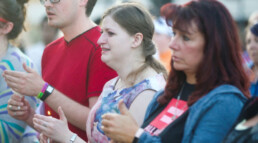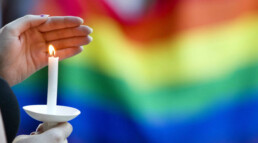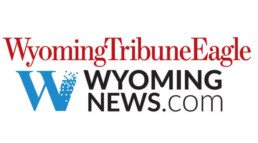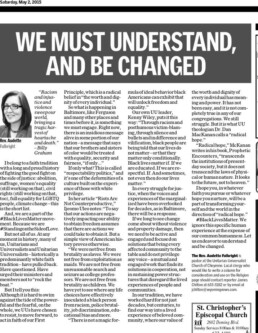GENY’s Virtual Transgender Day of Remembrance

November 15, 2020
Unitarian Universalist Congregation of Saratoga Springs
They shall grow not old, as we that are left grow old:
Age shall not weary them, nor the years condemn.
At the going down of the sun and in the morning
We will remember them.
― Lawrence BinyonFriends
|
Please make plans to join us on Sunday November 15th at 7PM for GENY’s first virtual Transgender Day of Remembrance.
As you may know, the Transgender Day of Remembrance is a significant and emotional annual event for our community. The event was created to memorialize those who were killed due to criminal acts of violence due to anti-transgender hatred. The event is held in November to honor Rita Hester, whose murder on November 28th, 1998, initiated the “Remembering Our Dead” web project and a San Francisco candlelight vigil the following year. Rita Hester’s murder, like most transgender hate crime murder cases, has yet to be solved. Although not every person represented during the Day of Remembrance self-identified as transgender (a person whose personal identity does not match the sex assigned at birth), each was a victim of violence based on prejudice and hate against transgender and non-binary people. The Transgender Day of Remembrance serves several purposes: We are bringing this emotional, and moving memorial to our community and our allies, during these dark days of isolation, with the hope that each of us will take a moment for personal reflection as we remember the lives lost this past year. As part of the event we are honored to have three distinguished community advocates who will deliver their thoughts on the times and world we live in: Ari Moore, longtime Buffalo community advocate, with a diverse career in art, law enforcement, education, and advocacy. Following these important Trans Voices, we will honor those we have lost as GENY Board Members read their names aloud. A closing by Reverend Audette Fulbright Fulson, of the Unitarian Church of All Souls NYC, completes the event. WARNING: As we read each honored name, we will be stating the explicit and horrific details surrounding their murder. We believe that only by speaking openly and honestly about what happened, can we force the media and public to fully observe, report and understand the impact that transphobia has on our society. By speaking hard truth, we hope to turn the tide of hatred and rejection into love and respect. We understand upfront that the graphic descriptions may be too severe for some people. We ask that you consider this before making your decision to join us. Event Details In planning this Memorial, we are taking aggressive steps to ensure the event will be secure and safe from outside interference. As a result, we will be asking you to register for this event. Once you receive your personal registration code, do not share it with other people. Have them register to receive their own personal link. Register in advance for this webinar: Juli Gender Equality New York https://genderequalityny.org/ |
https://www.uusaratoga.org/geny-virtual-transgender-day-of-remembrance/
Praying for Change: Daily Prayers for Anti-Racism (2020 Archive)
October 30, 2020
Discipleship Ministries
DAY 100 (OCTOBER 30, 2020)
Prayer for the Morning
Did you rise this morning,
broken and hung over
with weariness and pain
and rage tattered from waving too long in a brutal wind?
Get up, child.
Pull your bones upright
gather your skin and muscle into a patch of sun.
Draw breath deep into your lungs;
you will need it
for another day calls to you.
I know you ache.
I know you wish the work were done
and you
with everyone you have ever loved
were on a distant shore
safe, and unafraid.
But remember this,
tired as you are:
you are not alone.
Here
and here
and here also
there are others weeping
and rising
and gathering their courage.
You belong to them
and they to you
and together,
we will break through
and bend the arc of justice
all the way down
into our lives.
By Audette Fulbright Fulson, https://www.uua.org/worship/words/prayer/prayer-morning
https://www.umcdiscipleship.org/articles/archive-praying-for-change-daily-prayers-for-anti-racism
Women of Faith
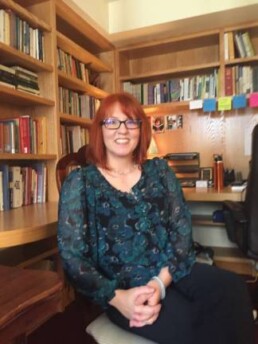
By CHRISTOPHER MOORE
December 14, 2017
The Spirit
They became the role models they didn’t have.
And they did it years before our #MeToo age, with its dramatic shifts in gender politics and women’s empowerment. A year after arguably the world’s most famous woman in politics did not break a glass ceiling, these women — in the realm of religion — do it every day.
These Manhattan-based women of faith, at different stages in their New York careers, play different spiritual and professional roles — one at a university, one at a church, one at a synagogue. From different traditions, these women share traits too, like a talent for busting barriers with grace and good humor.
Now they’re ready to mark the holidays of 2017 and the New Year with their services. And their own service, too.
Jewelnel Davis: ‘The win is in the diversity’The Rev. Jewelnel Davis says that part of her work is to walk tenderly through difficult emotions.
“This is going to sound sad, and I’m not sad about it,” she says in her basement office at St. Paul’s Chapel at Columbia University. “Chaplains are the keepers of secrets and the keepers of the dead. A lot of the time we are listening to where the soul aches.”
Davis has been listening for 22 years at Columbia, where she is also an associate provost. She likes the challenge and the idea of always being “in learning mode,” she says. “I think one is always humble. One is always aware that there is less that you know than you think you know.”
She talks with appreciation about the diversity at Columbia, including a Catholic ministry with links to the neighboring Corpus Christi Church, a vital Hillel presence and a “very active Muslim population.” Davis purposely does not conduct her own weekly services, as some university chaplains do, not wanting to zero in on one faith tradition. Instead, she oversees a rich array of programming, representing a broad swath of beliefs — as well as agnostics and atheists.
But she did arrive with a specific sense of mission. She wanted the university to interact more with nearby areas, including Morningside Heights but also reaching out to Washington Heights and Harlem.
“We have been able to rebuild and shore up relationships with the communities,” she says, adding that the mission only became more crucial in the aftermath of the university’s high-profile development to the north.
The idea of becoming a university chaplain came from Davis’s mentor, Jacob Neusner, an academic scholar on Judaism. At a pivotal crossroads, Davis wondered what was next in her career. Neusner asked Davis if she had ever considered becoming a university chaplain. “I said: Do you know any black people who are university chaplains? Do you know any women who are university chaplains?” Davis remembers. “And he said, ‘I don’t know any and it doesn’t mean you can’t be the first.’”
After a long tenure at Bard College upstate, Neusner died last year. But he left Davis with powerful memories of their conversations.
“I really liked Jack Neusner’s style of teaching and his fundamental belief that religion had to make the link between faith and the life of the mind,” Davis says. She grew up in the Baptist faith, but her work with Neusner underlines her passion for crossing religious traditions. “The win is in the diversity,” she says.
Today she estimates that about 40 percent of her job is in one-on-one counseling sessions. But she’s also been a high-profile presence during difficult moments, like the death of a student, or at times of turbulence, as when 25 students met in her nearby apartment for a post-election session last year. She’s never found her academic setting to be claustrophobic — just the opposite. “There’s never been a time when it felt like I was in a small, gated environment,” she says.
“It has challenged me. It has never disappointed me,” she says. “Every dawn brings new opportunities.”
On Oct. 8, she turned 60. “There are so many new things to learn,” she says, looking content. “It’s going to be a great decade.”
Audette Fulbright: “You fall in love with a church”The Rev. Audette Fulbright, the recently installed associate minister at All Souls Church on Lexington Avenue, sent her own photograph to Hillary Clinton.
In the picture, Fulbright was signing her contract to become the first woman to be called to serve All Souls, and the 12th minister named in the church’s 198-year history. After her official installation, Fulbright thought about the woman who did not get the nation’s top executive job last year.
“I sent it to Hillary because I was thinking of her that day,” recalls Fulbright, 49. Indeed Fulbright reached out to the defeated Democrat to show that even in the aftermath of a high-profile woman’s failure to advance to a top job, other women are still making gains.
In the ministry for 18 years, Fulbright was officially called this spring, moving her husband, Rob Fulson, and her younger daughter, Ani, from Wyoming to Riverside Drive for a new life. Her older daughter, Ember, lives in Virginia with her husband, Seth Berkley.
Serving now alongside Senior Minister Galen Guengerich, Fulbright took a higher-level position than the assistant minister job that others have held at the church.
She had other career options after being a minister in Wyoming for several years, but Fulbright chose both the congregation and this town. “You fall in love with a church,” she says.
Fulbright knows that part of her job is to push people into the future. “It’s a cliché, but you have to afflict the comfortable and comfort the afflicted,” she says. She believes in being specific, putting tangible ideas into people’s heads rather than speaking too generally.
She speaks enthusiastically about the faith she promotes. She says that when she visits a fellow Unitarian Universalist in the hospital, she actually has to ask about the person’s religion — whether he or she prays or believes in God or the extent or reach of faith.
“We have to all start from ground zero,” she says — and then adds, “I love that it’s harder.”
Part of the excitement of her new gig: living in the city. She likes the idea of the religious and ethnic diversity, and the range of “faith connections” possible here. “I wanted to raise my daughter here. I wanted her to be a citizen of the world and not just a citizen of a small town,” she says, before interrupting herself and explaining that she didn’t want to be “patronizing” about small towns. She remembers her own in South Carolina.
She grew up without a specific faith, then tried a lot of them.
“I have been everything along the way,” she says. She’s happy where she landed, but argues her fellow UUs have actually been too wary of proselytizing.
“We’ve been in the closet too much,” she says. “We’ve hidden a living faith from people which has the power to change and save lives.”
Within her religion, Fulbright says, more women are serving in ministry than men. But that has not been true at All Souls, where the senior ministers have all been white men. Until now.
“Seeing women in positions of leadership matters,” she says. “So that’s one thing.”
Another thing: working with senior minister Guengerich. She says she was inspired by her conversations with him.
She’s excited about “what ministry looks like when we work together. It will be different from two men.”
Felicia L. Sol: So much more than ‘sweetie’Rabbi Felicia L. Sol did not grow up thinking she would become a rabbi.
Actually, her brother was encouraged by the rabbi at their family’s synagogue to follow the religious route — but the young man grew up to be a poet and get a Ph.D. in literature.
Sol herself is the one who became a rabbi. She arrived at B’nai Jeshurun on the Upper West Side in 1996 in a Jewish education role.
“I came in for the interview and I got the job,” she says with a smile, sitting at a table in her office on West 89th Street, “and I never left.” She’s grown and changed roles over time, becoming a rabbi there in 2001.
Sol, 46, grew up first in East Brunswick, N.J., and then, at age 7, her family moved to New Fairfield, Connecticut, a small town near Danbury. “Of the five Jews in my grade, we were the most involved,” she remembers. Back then, while she always had that strong sense of Jewish identity, she thought of the rabbinate as a male-dominated job — because it was.
“No one ever told me you couldn’t be a rabbi as a woman,” she says, but then adds that she simply didn’t have a model. “When you don’t see anyone who looks like you in that space, it’s hard to imagine yourself in that role,” she says.
Now she’s the role model she didn’t see back then.
“The rabbinate has changed because women are in it,” she says. “Judaism is a patriarchal tradition. Women like me are both in love with that tradition and trying to dismantle the patriarchy from the inside.”
Sometimes that can be challenging, she readily admits. For instance, don’t bother calling this rabbi “sweetie,” “kiddo” or “honey.” Although some congregants do.
“They would never call a male rabbi those names,” Sol says. “At age 30, it might have been age-related. At 46, enough already.”
She adds: “It tends to be women who do that, which is interesting.” She thinks the familiarity might be partly because she’s grown up over the years at B’nai Jeshurun. She sees the role of rabbi as multi-faceted, including: teacher, pastor, holder of Jewish wisdom, community leader, justice-seeker. She oversees the synagogue’s senior program directors.
Still, she underscores her gratitude for where she is. “I’m really blessed to live at a time when I can serve in this role,” she says.
She has an educational background to match her many missions. She has a BA in developmental psychology and education from Tufts University, a masters in Jewish Education from a school at the Hebrew Union College-Jewish Institute of Religion (HUC-JIR) in New York; and her masters of Hebrew letters (1996) and her rabbinic ordination (1999), also from HUC-JIR.
Sol’s a mom to a seven-year-old son, Aiden, and a five-year-old daughter, Sivan. Her life as a single mother who never married brought about an appearance in a documentary, “All of the Above: Single, Clergy, Mother.” As a writer, she contributed an essay to the book “Faithfully Feminist: Jewish, Christian and Muslim Feminists on Why We Stay.”
Her parents are still in the small town in Connecticut, and Sol visits. “I still bring my two kids back to the July 4 parade,” she says.
What do her own parents think about having a daughter who’s a rabbi?
Sol grins. “They think it’s awesome,” she says.
https://www.westsidespirit.com/news/local-news/women-of-faith-NANP1320171214171219958
Cheyenne locals show support for shooting victims
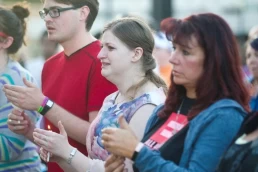
By KRISTINE GALLOWAY
June 17, 2016
Wyoming Tribune Eagle
CHEYENNE – An entire community came together Thursday night at the Depot Plaza in downtown Cheyenne.
Not everyone in the city came to remember the 49 lives lost in Orlando, Florida, on Sunday and support the LGBT community, but a few hundred did. And those few hundred included people of all ages and all races.
Multiple churches and religions sent an official representative to speak, including Presbyterians, Catholics, Jews, Muslims, Episcopalians and Unitarian Universalists.
The Cheyenne Police Department sent Sergeant Adam Deball to speak, and Wyoming Rep. Mary Throne, D-Cheyenne, attended to show her support.
Although the focus of the vigil was peace and acceptance, Jeran Artery, chairman of Wyoming Equality, told the crowd they have every right to be angry.
“It’s OK to get angry at the more than 200 anti-LGBT bills that have been introduced across this country so far this year. It’s OK to be angry at religious bigotry and extremism when we are called pedophiles and second-class citizens that are not worthy of equality,” he said.
Artery encouraged attendees to stand in solidarity with the LGBTQ community. “Together we are stronger. We won’t let terrorists win. We won’t let our voices be overcome, and we will not disappear quietly into the night as many would have us do,” he said to cheers throughout the crowd.
Sara Burlingame, the education outreach coordinator for Wyoming Equality, also spoke of the struggles the LGBT community faces.
Burlingame said she was raised in the Baha’i faith, which is a branch of Islam.
“Everything that I knew about gentleness, everything I knew about mercy and peace, came from a faith that came from Islam, and it shaped and formed who I am,” she said.
Mohammed Salih, speaking on behalf of the local Muslim community, said the shooter in Orlando, Omar Mateen, was not a true Muslim.
“The terrorist might have claimed to be a Muslim, but his criminal, inhuman action proves otherwise,” he said.
“We offer our sincere condolences to the families who lost their loved ones, we give our support to those who were injured in this cowardly attack. May God give rest and peace to those who lost their lives. May God grant patience and understanding to their families and loved ones.”
Rabbi Larry Moldo of Mount Sinai Synagogue in Cheyenne recited the Kaddish for the victims who died in Orlando.
“Jews recite Kaddish when someone dies, on the anniversary of their death and during memorial services. While the requirement for reciting Kaddish is limited to close relatives, it can be recited for anyone whether you know them or not,” he said.
Pastor Rodger McDaniel said the roots of hate cannot grow without soil supporting it.
“Our purpose in gathering here with you tonight is to say, ‘We are one, both the LGBTQ and the Muslim communities,’” he said. “We are here to turn over the tables of your enemies just as Jesus turned over the tables in the temple to help lift that shadow King David spoke of, and to make sure that whether it’s politicians or ministers or anyone else scattering the seeds of bigotry, that there is no good soil or hate to grow here,” he said.
Rep. Mary Throne said Wyoming supports Orlando because Wyomingites believe in supporting our neighbors.
Toward the end of the vigil, Carol Pascal read the names of each of the 49 dead from the Orlando shooting at the Pulse nightclub, and the crowd repeated them back to her.
Just before the vigil closed with the crowd singing along to Marcie Kindred’s version of Jeff Buckley’s “Hallelujah,” the Rev. Audette Fulbright of the Unitarian Universalist Church addressed the crowd.
“As we extinguish our candles tonight, remember that the light that we have kindled together is never truly extinguished, and if you feel like yours is flickering, reach out to someone you know and love and trust. There is someone there for you, and you are wanted and needed,” she said.
Burlingame finished the night with, “We know there is great brokenness, we know there is great violence, but we know that when we join together in love that we heal the world. So let’s go out and heal our world.”
https://www.wyomingnews.com/news/cheyenne-locals-show-support-for-shooting-victims/article_398482f2-3451-11e6-a97d-1bfe1a2919d0.html
Vigils planned in Wyoming following Orlando shooting
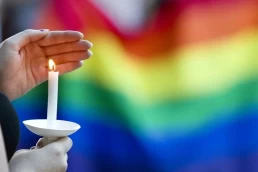
By MATT MURPHY
June 14, 2016
Wyoming Tribune Eagle
CHEYENNE – Vigils are being planned in several Wyoming cities this week in memory and honor of the victims of Sunday’s mass shooting at an Orlando nightclub.
In Cheyenne, a vigil will be held Thursday at 7 p.m. at the Cheyenne Depot Plaza.
Other vigils and events across the state are being announced as they are finalized.
A vigil in Casper was held Monday night, and a vigil in Laramie is scheduled for today at 7:30 p.m. at the Unitarian Universalist Fellowship, 1402 E. Gibbon St.
Wyoming Equality Director Jeran Artery said the vigil in Cheyenne will be “a time to remember and celebrate the lives in Orlando.”
Artery said he learned of the Orlando shooting Sunday morning – a sharp contrast to Saturday’s Pride in the Park picnic at Romero Park.
“You never know when you’re going to wake up and turn on the TV and find out the world has changed,” he said. “(Saturday) was a day of joy, and then (Sunday), I couldn’t stop crying when I started watching the stories (of the victims),” Artery said.
Artery said the attack is a reminder of work that needs to be done to combat hatred and discrimination against lesbian, gay, bisexual and transgender people.
Wyoming Equality will still have a booth at the Denver Pride festival this weekend and will continue to support LGBTQ events around the state.
“We will continue, and we won’t be intimidated, and we won’t be scared,” Artery said.
The Rev. Audette Fulbright of the Unitarian Universalist Church of Cheyenne said LGBTQ members of her congregation have been emotionally affected by the attack.
Sunday’s service at Fulbright’s church happened to be a “flower communion,” a service that is meant to celebrate the differences and contributions of each member of the church.
That service had a noticeable effect on some members, Fulbright said.
“After the service, one of the LGBTQ members of the congregation was just sitting and shedding a few tears,” she said.
Fulbright said there’s a sense of sadness, and also frustration – feelings that have increased as the details of the shooting have emerged.
She said congregation members emotionally affected by the shooting are dealing with it in different ways, whether by talking to friends and family or planning to attend vigils.
“Those public expressions of grief actually carry more power than you might realize,” she said.
What you can do
Several ways to help in the wake of the Orlando mass killings exist, including:
1) Call LGBTQ friends and family members and let them know you are thinking about them, Fulbright said.
Fulbright said she has had friends tell her that a simple phone call meant a lot.
“Speak to them in person and just say, ‘I’m thinking about you,’” she said. “This is an important moment for reaching out.”
2) While the Orlando Sentinel reported that blood banks in that city were overwhelmed with donors Sunday, more blood donations will be needed later in the week.
But regardless of where a donor lives, blood donation can still be a sign of support.
United Blood Services, a nonprofit operating mostly in the West – including Cheyenne – and parts of the deep South, has issued a call for blood across all areas it services.
While the organization has sent blood to Orlando, organizers are encouraging replenishment of local supplies.
“When tragedy strikes, it’s the blood on the shelves that saves lives,” Justin Irish of United Blood Services said in a press release.
In Cheyenne, the blood center at 112 E. Eighth Ave. is taking donations this week, and appointments are encouraged.
Appointments can be made by calling 877-827-4376 or visiting United Blood Services.
3) A GoFundMe account for monetary donations for Orlando shooting victims has been set up through Equality Florida.
That organization is being assisted by the National Center for Victims of Crime, which helped distribute funds after both the Chattanooga and Aurora shootings.
The address for the GoFundMe account is Pulse Victims Fund.
Following the original publication of this story, other vigils have been set:
In Jackson, a vigil will be held tonight, Tuesday, June 14, at 7 p.m. at the Jackson Town Square.
A vigil will also be held tonight, Tuesday, June 14, at 7 p.m. in Sheridan at the Kendrick Park Band Shell.
Wyoming Equality is posting information on its Facebook page as events are scheduled.
https://www.wyomingnews.com/news/vigils-planned-in-wyoming-following-orlando-shooting/article_a9a1668a-31f5-11e6-ae90-070e944d976f.html
We need to take care of each other

By REV. AUDETTE FULBRIGHT FULSON
May 14, 2016
Wyoming Tribune Eagle
Unitarian Universalist churches are built on the bedrock of service to others and service to their community.
Inside our doors, we pray that people are spiritually fed, encouraged to grow strong in a faith that uplifts and equips them for changing the world, for bending the arc of justice down into our own community, for being a beacon of hope and welcome to people, affirming that they are worthy of love.
Each Sunday, one of our board members welcomes our members and guests with these words:
“You are welcome here among friends in this house of fellowship. Whoever you are, whatever you believe, whomever you love, we are glad you are here.”
A good church can do much for a community, but it cannot do all things. Wyoming is a beautiful state with a small population.
Folks here will tell you the state itself operates like a small town; people take care of each other when they need to, but mostly they prefer to let their neighbors be.
At the same time, our state is struggling. The changing face of energy is hitting us hard. We need to be able to attract new businesses, and build an economy that is dynamic and resilient.
To do that, we need to make sure that Wyoming does what its residents claim they do: take care of one another. That means everyone.
But do we really take care of each other well? We have the highest suicide rate in the nation.
Not too long ago, headlines were made again when a young gay man, Trevor O’Brien, committed suicide in Wyoming. His family points to the bullying he was subjected to as a significant factor in his decision to take his own life.
He’s not alone. We know our LGBT family members and friends too often face a toxic mixture of silence and condemnation. It takes too many from us.
If we, and they, are lucky, they only move away and leave us behind. If we are unlucky, we lose someone like Trevor.
One way we could take another step on the road to making Wyoming a genuinely healthy community that takes care of its people is to pass a non-discrimination ordinance.
This is essential to economic growth and to protect all of our citizens – and despite what some would tell you, our LGBT friends and families need this basic protection.
Another way is to pass Medicaid expansion – we could save money and lives. Caring for one another may mean more action than is sometimes the Wyoming way.
What if we were to do things here in Wyoming that said “you are welcome here in this place of fellowship?”
What if we cared for one another in such a way that we literally saved one another’s lives? That’s the kind of “small town” state that many people long for. That’s the kind of state our church works for every day.
The Rev. Audette Fulbright Fulson is pastor of the Unitarian Universalist Church of Cheyenne. Local clergy who would like to write a column for consideration and use on the Religion page should contact reporter Becky Orr at 307-633-3183 or by email at borr@wyomingnews.com.
Wyoming losing its religion

By JAMES CHILTON
May 13, 2015
Wyoming Tribune Eagle
CHEYENNE – Americans are losing their faith faster than ever before.
That is among the key conclusions of the new U.S. Religious Landscape Study released this week by the Pew Research Center in Washington, D.C.
Throughout 2014, Pew asked more than 35,000 Americans in all 50 states about their religious preferences. What it found is that the number of Christian adherents has been dropping for Catholicism, mainline Protestantism and, to a lesser degree, evangelical Protestantism.
Conversely, the percentage of Americans identifying themselves as unaffiliated with any religion has jumped, from 16.1 percent in 2007 to 22.8 percent in 2014.
The number of people in non-Christian faiths also has risen, albeit more slowly, from 4.7 percent in 2007 to 5.9 percent in 2014.
The Pew study found that younger Americans, particularly the millennial generation born after 1980, has been the biggest contributor to the rise in “nones,” or those who profess no specific religious faith.
“While many U.S. religious groups are aging, the unaffiliated are comparatively young – and getting younger, on average, over time,” the study concluded.
On a state-by-state basis, the rise in the irreligious has been most prevalent in the West, where many states, including Wyoming, report a higher proportion of unaffiliated than the U.S. average.
Specifically, about 26 percent of Wyomingites identify as unaffiliated. Of that 26 percent, only 3 percent identify as atheists, while another 3 percent identify as agnostic – a belief that it’s impossible to know whether a deity exists.
The remaining 20 percent simply state “nothing in particular” for their religious beliefs, though of that number, half of the respondents still said religion was “somewhat” or “very” important in their lives.
The trend may be cause for concern among local faith traditions, many of which are finding themselves confronted with the problem of how to attract millennials in new ways.
The Rev. Rodger McDaniel is the pastor at Highlands Presbyterian Church, a mainline Protestant denomination. He also is a past president of the Cheyenne Interfaith Council.
McDaniel said he has seen for himself how the younger generation, especially, is less inclined toward religion. But he said he doesn’t see it so much as a rejection of faith altogether, but rather a rejection of what he sees as the modern popular perception of Christianity.
“I hear from people who are offended by what they see as the face of Christianity, which is often times the talking heads on radio or television who espouse a very intolerant, exclusive view of Christianity,” McDaniel said. “I run into a lot of people who just can’t accept the idea there is only one way to have a relationship with God.”
He said that as some churches have taken a greater role in hot-button political issues like abortion or same-sex marriage, adherents who may disagree with their church on those issues are fleeing the pews.
“The faces they see are those who are intolerant, and people don’t want to be a part of that, and they tend to lump us all together,” McDaniel said.
Paul Flesher, a religious studies professor at the University of Wyoming, agrees with much of that assessment. He noted that many Western states are culturally libertarian, favoring a “live and let live” attitude toward their neighbors.
He said that when religions go against that attitude, it can turn people in those states off to religion.
“What I’m seeing happening is, on one hand, evangelical and the more right-wing strains of Christianity are gaining a lot of political power. But on the other hand, the public image of Christianity they are presenting as they do that is not attractive,” Flesher said. “In Wyoming, if we’re driving down the road in the middle of the winter, we’ll help someone who’s slipped off the road; it doesn’t matter what their religious or political beliefs are, as long as you stay off my land.”
He also noted that the number of nonreligious Americans claiming “nothing in particular” as their preference, compared to the much smaller number of avowed atheists and agnostics, suggests that for many, the question isn’t so much whether gods exist, but rather “who cares?”
“For a lot of people, religion just doesn’t matter; it’s not high on the list of things they think about,” Flesher said. “In Wyoming, I think that comes partially from individualism and partly from a certain amount of isolation, not defining your community around a religious organization.”
Father Carl Gallinger, the vicar general of the Roman Catholic Diocese of Cheyenne, said that while his diocese hasn’t been seeing any mass exodus of worshippers, he believes the church should be doing more to reach out to younger people especially. He believes that many millennials differ from older generations in that they weren’t raised in a faith and are thus less likely to consider the question.
“I’m not sure we’ve done the very best job of helping them become disciples of Jesus Christ in the Catholic tradition, and I also think societal and cultural influences have made it much easier for them to walk away from practicing their faith,” Gallinger said.
Gallinger said the election of Pope Francis, who has placed a renewed emphasis on helping the poor and the underprivileged, has helped to revitalize interest in Catholicism.
“I think people are encountering Pope Francis in a very positive way and are seeing him concerned about the least among us,” Gallinger said. “For many people, that’s very attractive, recognizing the call that Jesus gave us to be a service to the poor.”
But for many millennials, McDaniel said the issue isn’t so much one of faith as how that faith is interpreted and strengthened. He argued that many young people aren’t as comfortable with the traditional church service and are seeking other outlets.
“There are a lot of people in the millennial generation for whom 10 o’clock on a Sunday morning isn’t the ideal time for them to have one more day where they have to get everybody out the door by a certain hour,” McDaniel said.
Unitarian Universalist Church of Cheyenne Pastor Audette Fulbright said she has seen more adherents leaving or shunning traditional churches for a more holistic exploration of religion. She agreed with McDaniel that some people are simply getting tired of prescriptive dogma and would rather hold conversations than listen to sermons.
“Younger people, especially, are looking for authenticity in their experiences, period,” Fulbright said. “And the way we’ve classically done church in both the Catholic and Protestant traditions, there’s a ritual and a form that doesn’t always speak to the immediate needs of people’s lived experiences.”
Both Fulbright and Flesher noted that having children often can be a catalyst in bringing nonreligious people back into the religious fold.
“The most likely time is when they have children and want to find something that helps them to establish clear values,” Fulbright said. “They want their children not to be religiously illiterate.”
Casper man reconnects with father’s civil rights past 50 years later

By JAMES CHILTON
March 15, 2015
Wyoming Tribune Eagle
CHEYENNE – Growing up, Steve Reeb never knew his father.
He knew of his father, of course – all his life, he had been told that the Rev. James Reeb was a hero, a martyr to the civil rights movement.
A Unitarian Universalist minister from Boston, the elder Reeb lost his life in Selma, Alabama, where he was fatally beaten by white segregationists. This was at the height of the Selma to Montgomery marches of 1965, when thousands of demonstrators walked the 54-mile highway from Selma to the Alabama state capital in support of equal voting rights.
James Reeb’s death on March 11, 1965, led to a national outcry against the Jim Crow laws of the South, and just days later, President Lyndon Johnson would convene a nationally televised joint session of Congress to address the need for the Voting Rights Act.
That historic bill would be signed into law five months later. But for Steve Reeb, then just 3 years old and living in Casper, the civil rights victory did little to fill the now-gaping hole in his life.
“As a young child, I knew what he did, and I knew what the results were,” Reeb said. “But when you’re a young boy, you’re dealing with questions like, ‘Who’s my dad? Who’s going to take me to play baseball?’ I just kind of swept it under the rug.”
For half a century, Reeb was quiet about his father’s life and legacy. But this year, the Cheyenne physician saw an opportunity to finally learn just who his dad was.
“I knew the 50th anniversary of Selma was coming up,” Reeb said. “My daughter would come home from school – she was 8 – and she would talk about Jim Crow laws, segregation in the South, and I said, ‘Oh my gosh, she doesn’t even know about her own grandfather.’
“At that point, I was compelled to go,” Reeb added.
And he wasn’t the only one. In all, 17 members of Reeb’s family made the trip to Selma earlier this month to take part in commemorating the 50th anniversary of the marches. The journey was as personal as it was educational, as Reeb was able to get in touch with some of his father’s personal friends and fellow activists.
Those included Unitarian pastors Clark Olsen and Orloff Miller, who survived the same assault that claimed James Reeb’s life. Olsen and Miller took Steve Reeb to the spot where the attack took place, walking him through the event.
“They met us at the site where they were walking out of the restaurant, and we took a right and started walking down the sidewalk,” Steve Reeb said. “They said they saw four or five guys coming out of a store across the street who came up behind them, and they told themselves to quicken the pace.”
One of the men yelled out a racial epithet, and then, Reeb said, “One of the pastors turned around just in time to see a man swing a club at my dad’s left temple. It was over in 30 seconds, and they ran.”
The Rev. Audette Fulbright, pastor of the Unitarian Universalist Church of Cheyenne, also was in Selma for the 50th anniversary. By coincidence, she had personally studied under Olsen in Asheville, North Carolina, and was familiar with the story of the attack on James Reeb.
“A lot was going on, and they couldn’t get emergency services,” Fulbright said. “The ambulance didn’t take them to the nearest hospital, it took them away.”
It was hours before James Reeb was admitted to a hospital in Birmingham, where he died two days after the assault. On March 15, the Rev. Martin Luther King Jr. gave a eulogy for Reeb at Brown’s Chapel in Selma.
“He demonstrated the conscience of the nation,” King said. “He was an attorney for the defense of the innocent in the court of world opinion. He was a witness to the truth that men of different races and classes might live, eat and work together as brothers.”
During his time in Selma, Steve Reeb also got the chance to speak with Ron Engel, who had been a personal friend of his father’s before the Selma marches.
“He gave us an account of the personal aspect, the humanistic side of my father that he knew two years before he was killed,” Reeb said. “He had written down quite extensive thoughts, and hearing his words was equally as important as hearing the Unitarian ministers describe the last walk.”
Both Reeb and Fulbright were present to mark the 50th anniversary of “Bloody Sunday,” when marchers were beaten by police as they attempted to cross Selma’s Edmund Pettus Bridge on March 7, 1965. But where only a few hundred marchers crossed then, Reeb and Fulbright were joined by tens of thousands of others.
“President Obama and his daughters, their crossing of the bridge shows the great progress that’s been made, while at the same time, there’s still so much work to do,” Fulbright said. “This is a pivotal moment in history, just like 1963 and 1965 – but also just like every day is. We are called as Dr. King was called, and we are called to the same exact work.”
For Reeb, the trip helped to bring closure to an issue he had left unresolved for half a century.
Seeing the crowds and speaking with the people who helped change history, he said he came away from Selma with a newfound appreciation of his father’s life, and the legacy that he and so many others have left for today’s America.
“It was huge because I’d been avoiding this thing for 50 years, and I wish I would’ve done it earlier,” Reeb said. “I can see enough change, and I can see enough people that know of him and know of what he was – what he fought for and believed in, and the courage it must take to come to Selma, a place from which you might not return.
“I’m very proud, along with all the other people who are proud of him too,” Reeb added. “You can never say it was just one person, but he did have a part. And I do understand the significance of it more.”
https://www.wyomingnews.com/news/casper-man-reconnects-with-fathers-civil-rights-past-50-years-later/article_4d5c01b7-e7b8-5954-8cc9-5283594ed000.html
Reflecting on King’s dream
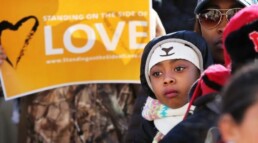
By LUCAS HIGH
January 20, 2015
Wyoming Tribune Eagle
“I have a dream that my four little children will one day live in a nation where they will not be judged by the color of their skin, but by the content of their character.”
– The Rev. Dr. Martin Luther King Jr. in his famous “I Have a Dream” speech, delivered Aug. 28, 1963, in Washington, D.C.
The Rev. Martin Luther King Jr. famously hoped for a brighter future for American children of all races, and C.J. Brown’s family is proof that the spirit of King’s dream is alive and well in the Capital City.
Three generations of Brown’s family – including his daughter, Kim Brown, and grandson Xavier Puls – joined hundreds of others Monday to honor King with a march through downtown.
“It’s important for me, someone who was there and remembers the civil rights era, to be able to share this march with my family, with the younger generations,” said Brown, 66, a former member of the Cheyenne City Council.
“We have come a long way, but my fear is that our young people will forget about the struggle because they never really lived it. They inherited the opportunity to live in a world where blacks and white are together,” he said.
“I saw the civil rights struggle firsthand. (Kim) saw part of it, but she missed a lot of the pain of suffering. And (Xavier) has experienced it through the stories and the history. That’s why these marches are so important. If we fail to march and to keep this history and these stories alive, we will just go back to the old comfortable camps of whites with whites and blacks with blacks.”
Kim, 38, said, “I can honestly say there has been progress. I know when I was coming up, when I was (Xavier’s) age, it was very explicit that white was white and black was black and Mexican was Mexican. There was quite a bit of division.
“Living in Cheyenne all of my life, I’ve dealt with the good and the bad. But each year it’s gotten better. I’ll always be grateful for the equality that we can enjoy now. Martin Luther King and our civil rights leaders have sacrificed to allow for us to have the liberties that we have now.”
Kim said that during her lifetime, society has become much more accepting of interracial relationships and marriages, pointing to her 12-year-old multiracial son, Xavier, as evidence.
“When I was growing up, there were a lot of people that were taught to stick with their own (race), and that’s just the way it is. But there were others that were taught that there is a rainbow out there for a reason, and you have the right and the privilege to explore that rainbow now.”
Xavier credits the men and women of the civil rights era with making the society his generation inhabits a more accepting one.
“When Martin Luther King came, he changed everything. He made everything better,” he said. “He’s our savior. He brought all of us together so we don’t have to fight anymore.”
But Xavier accepts that not everything is perfect, and King’s dream of a country where the color of a child’s skin is irrelevant has yet to fully materialize.
“People will bring up my (multiracial background) at school, and I really don’t like it. There are a few kids at school that will tease me about what I am, what my color is. But I just try to ignore them.”
C.J. Brown said that while racial inequality and bigotry still exist, the most important issue isn’t white versus black, it’s rich versus poor.
“The real battle we face now is economic. There is still a struggle,” he said. “Whether you are black or white or from the (Native American) reservation, the struggle now is making sure you can make a living and provide a future for your kids.”
The speakers who addressed the crowd of more than 300 after Monday’s march from the Cheyenne Depot to the State Capitol echoed this sentiment.
“Dr. King died fighting the structures that hold people in poverty. Today, more people than ever have fallen below that (poverty) line, and income inequality is at record highs,” said the Rev. Audette Fulbright, pastor of the Unitarian Universalist Church in Cheyenne.
Sergio Maldonado, a representative of the Northern Arapaho Tribe in Wyoming, said the country is still struggling with economically “marginalized communities” of all races.
“Today, we have poor in America, and we have poor in Wyoming, and we have poor on the Wind River Indian Reservation,” he said. “But I believe we have ample room to grow and to make that better.”
https://www.wyomingnews.com/news/reflecting-on-kings-dream/article_786367ad-f993-59a9-9bfc-ccdea3914b50.html

